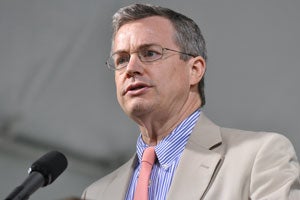Katy Glenn, David Haller and Nick Hartigan Receive Pro Bono Service Award
Demonstrating a strong commitment to public service, the class of 2009 put in a record total of 308,605 pro bono hours, more than any previous class.
This year’s graduates achieved an average of 542 hours of pro bono work per student, 502 hours more than the 40 required for graduation. Ninety-six students provided more than 1,000 hours of free legal services during their years at HLS.
The Law School’s focus on public service has led to an increasing number of pro bono hours each year for the last five years. In 2005, graduates worked 181,341 public service hours; 2006 graduates totaled 239,533 hours; the class of 2007 turned in 270,653 hours; the class of 2008 reached 294,140 hours; and this year’s graduates bested 2008’s high total by 14,465 hours.
Most students perform their pro bono service through clinical programs, in which they often represent clients in actual cases under the supervision of experienced lawyers while enrolled in related academic courses. HLS has the largest clinical legal education program in the world, with clinics in more than 36 different substantive practice areas, including cyber law, environmental law, human rights, criminal justice and even war crimes prosecution.
The class of 2009’s clinical participation was also high, with 72 percent of graduates working in at least one clinic during their time at Harvard, and 39 percent working in more than one clinic.
Three clinical students—each of whom put in 2,500 hours of pro bono service during their three years at Harvard Law School—were recognized on Class Day with this year’s Andrew L. Kaufman Pro Bono Service Award.
 Katy Glenn ‘09, David Haller ’09, and Nick Hartigan ’09 will share the award, granted each year in honor of Professor Andrew Kaufman, who has been instrumental in creating and supporting pro bono work at HLS.
Katy Glenn ‘09, David Haller ’09, and Nick Hartigan ’09 will share the award, granted each year in honor of Professor Andrew Kaufman, who has been instrumental in creating and supporting pro bono work at HLS.
Glenn [photo right] compiled her 2,500 hours while working in a variety of HLS clinics, with a focus on international work. She is President of HLS Advocates for Human Rights, a student practice organization in which 1Ls and upperclassmen work on a variety of human rights issues in collaboration with the HLS International Human Rights Clinic. Glenn worked for five semesters with the Human Rights Clinic, including two summers abroad, with the Sierra Leone Court Monitoring Program and with the Association of Environmental Lawyers of Liberia (Green Advocates). She has also worked in Haiti.
In addition, Glenn worked in the HLS Prison Legal Assistance Program, a student practice organization in which she represented Massachusetts prisoners in disciplinary and other hearings. She also was an intern with the Massachusetts ACLU, conducting research on the grounds on which immigrants may be detained, and how to challenge detention, among other projects.
 Haller [Photo left] and Hartigan are members of the Harvard Legal Aid Bureau, the oldest student-run legal services organization in the nation. Through direct client representation and by founding No One Leaves, an organization to mobilize law and college students in the Boston area to canvass city neighborhoods to provide information to residents, Haller and Hartigan have helped stem the foreclosure crisis in the city and helped hundreds of people stay in their homes. Each has put in at least 40 hours a week in this groundbreaking effort. See recent profile of their work in the Harvard Gazette.
Haller [Photo left] and Hartigan are members of the Harvard Legal Aid Bureau, the oldest student-run legal services organization in the nation. Through direct client representation and by founding No One Leaves, an organization to mobilize law and college students in the Boston area to canvass city neighborhoods to provide information to residents, Haller and Hartigan have helped stem the foreclosure crisis in the city and helped hundreds of people stay in their homes. Each has put in at least 40 hours a week in this groundbreaking effort. See recent profile of their work in the Harvard Gazette.
 Hartigan [Photo right] also worked with the Prison Legal Assistance Program and, over the summer, for the U.S. Attorney’s Office in the Eastern District of Virginia, while Haller worked for the State Department’s Office of the Coordinator for Reconstruction and Stabilization, assisting in stabilizing post-conflict situations in order to promote democracy and peace.
Hartigan [Photo right] also worked with the Prison Legal Assistance Program and, over the summer, for the U.S. Attorney’s Office in the Eastern District of Virginia, while Haller worked for the State Department’s Office of the Coordinator for Reconstruction and Stabilization, assisting in stabilizing post-conflict situations in order to promote democracy and peace.
Lisa Dealy, Assistant Dean of the Office of Clinical and Pro Bono Programs, said the students’ commitment to public service is inspiring. “We are humbled by how much you’ve accomplished in your time here at HLS and hope that you all know what an indelible mark you’ve left on Harvard,” she told them, in informing them of the award. “Harvard Law School, the Boston community and the world are all better because of you.”
The Kaufman award is given each year to the graduating student who has performed the highest number of pro bono service hours while attending HLS. Typically, a single J.D. student is chosen to receive the award along with a $500 honorarium. “This year, because of their extraordinary service, we could not choose just one recipient,” said Dealy. “Thus, we are awarding three awards: one for international human rights work and two for the domestic legal services work.”
In April Haller and Hartigan also received an Outstanding Student Award from the national Clinical Legal Education Association in recognition of their work in the foreclosure field.
